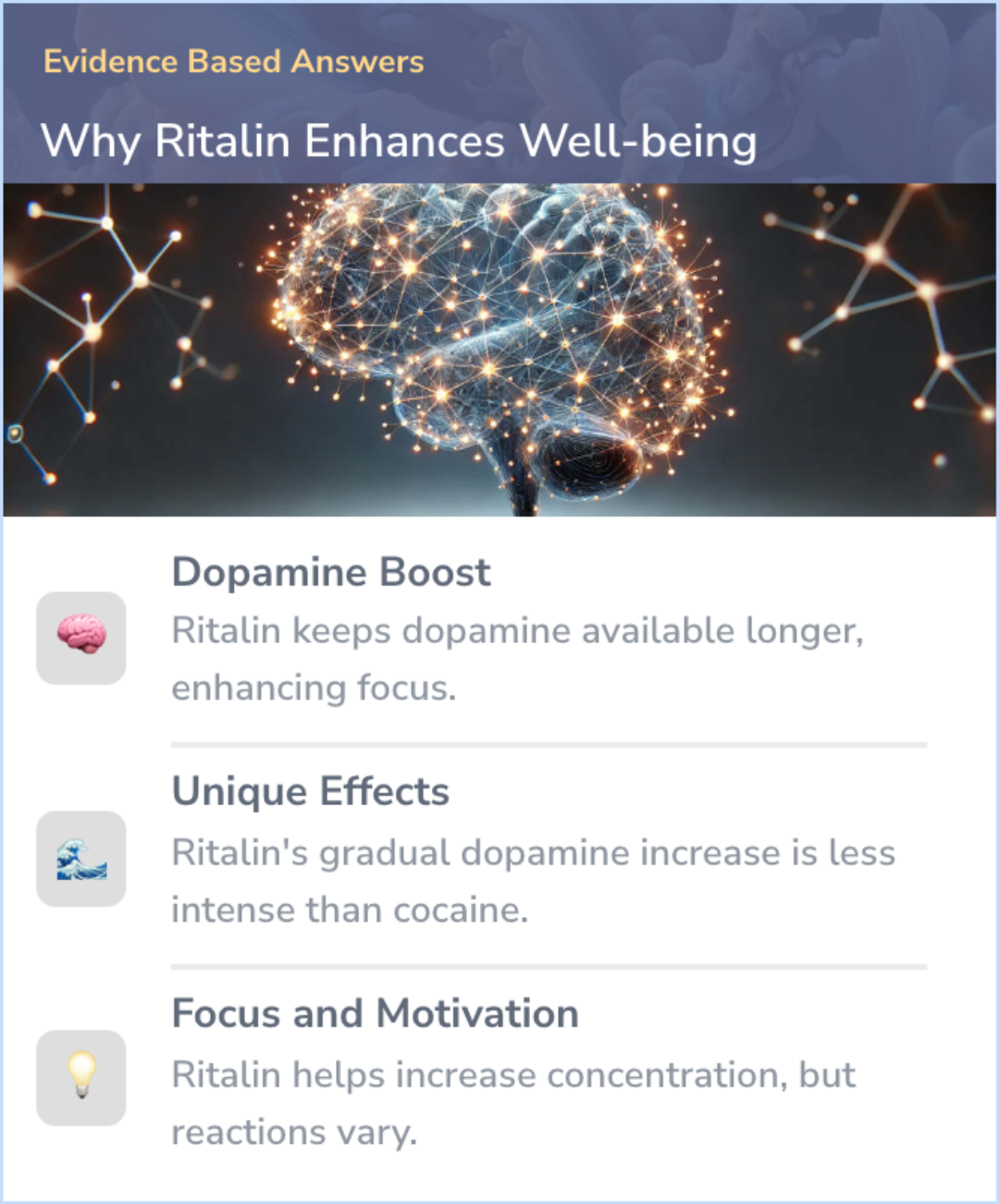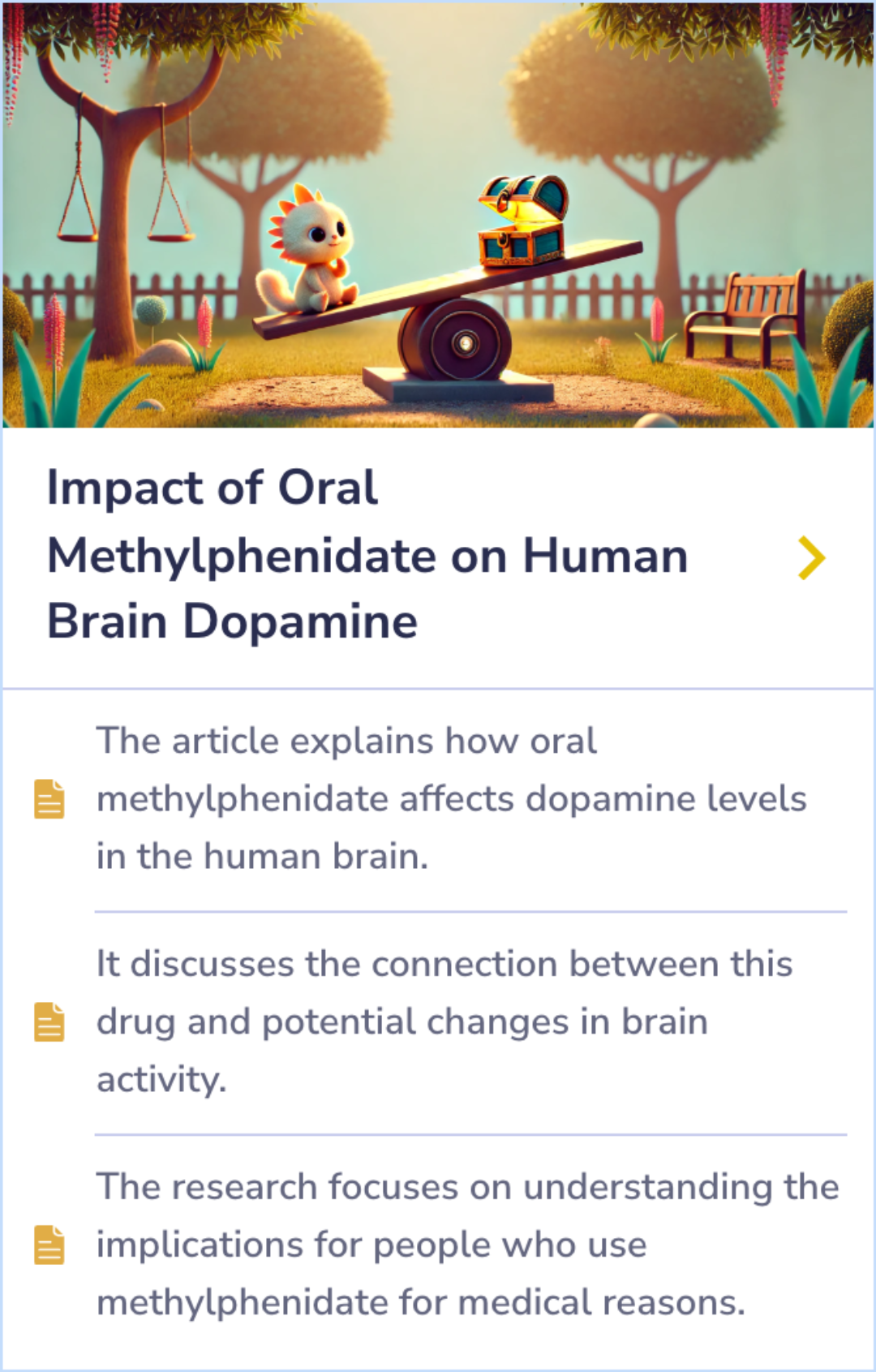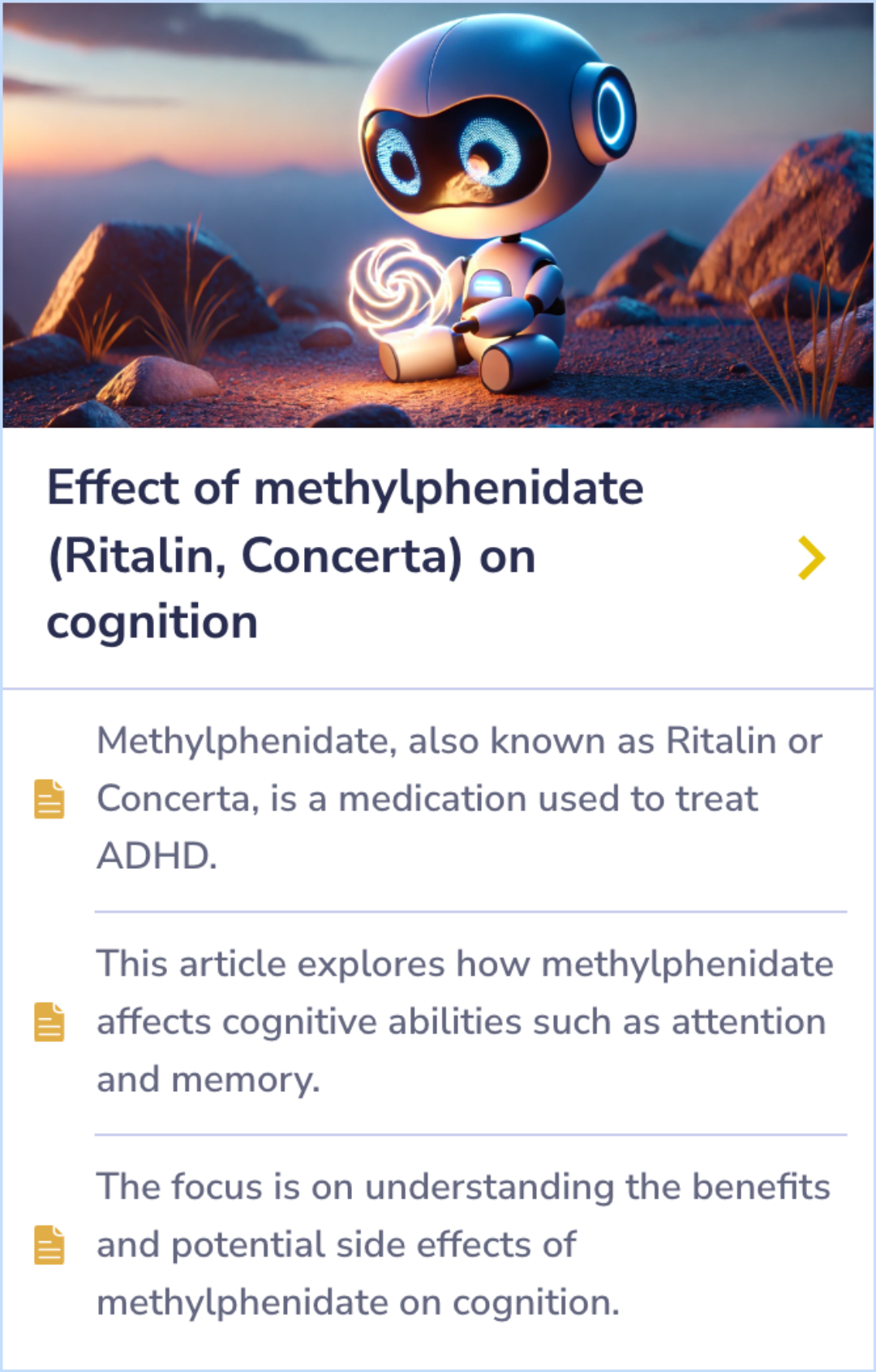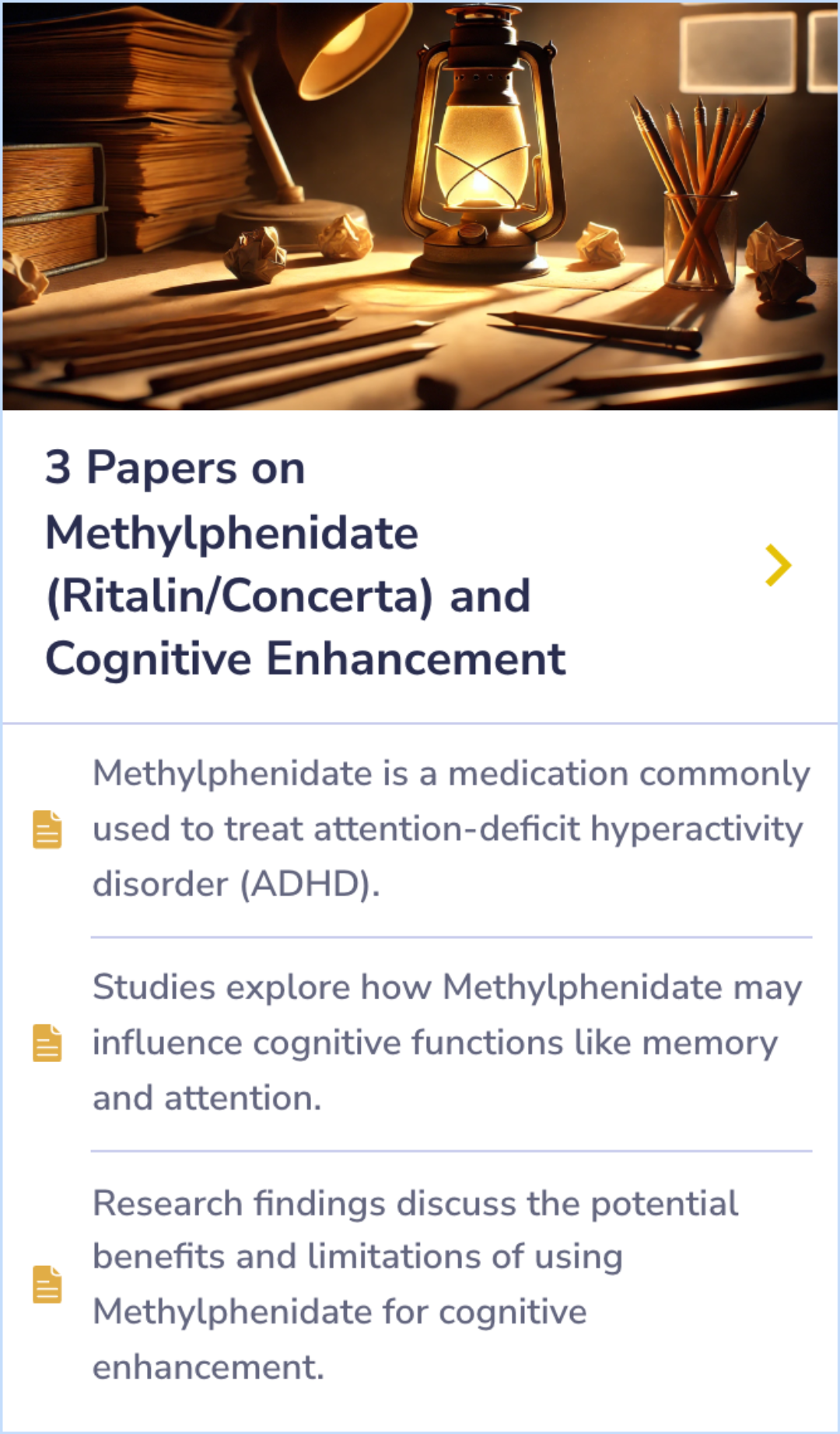Ritalin
Evidence Based Answers
Why does Ritalin feel so good?
Taking Ritalin without ADHD may affect brain reward systems, offering short-term benefits with potential risks. Analyze effects on focus and overall cognitive boost.
Published: November 3, 2024
Click to explore a section:

Ritalin increases dopamine levels gradually, enhancing focus without intense highs and maintaining effectiveness across individuals.
How Ritalin Boosts Dopamine Levels
Ritalin, known scientifically as methylphenidate, blocks the reuptake of dopamine, a neurotransmitter linked to reward and motivation. By keeping dopamine in the synapse longer, Ritalin increases its availability, which can make users feel more focused and motivated.
Research shows that Ritalin affects key brain areas like the striatum and nucleus accumbens, regions tied to reward processing. Unlike other stimulants that release new dopamine, Ritalin’s approach is more controlled, resulting in a gradual increase in dopamine that supports its therapeutic effects.
Research shows that Ritalin affects key brain areas like the striatum and nucleus accumbens, regions tied to reward processing. Unlike other stimulants that release new dopamine, Ritalin’s approach is more controlled, resulting in a gradual increase in dopamine that supports its therapeutic effects.
“
Source Quotes:
Methylphenidate binds to the dopamine transporter in the presynaptic cell membrane, blocking reuptake of dopamine and causing a resultant increase in extracellular dopamine levels.,The highest area of methylphenidate uptake in humans is in the striatum.
The mechanism of action of methylphenidate is not completely understood, but the drug has long been thought to block the reuptake of dopamine in the brain.
Why Ritalin Feels Different from Cocaine
While both Ritalin and cocaine block dopamine transporters, their effects feel different. Ritalin causes a more gradual increase in dopamine, making it feel less intense and 'rewarding' than cocaine, which leads to a rapid dopamine spike. This slower action helps Ritalin effectively manage ADHD symptoms without creating the intense 'high' linked to cocaine.
Ritalin’s effects last longer in the brain, further distinguishing it from cocaine. This steady dopamine increase aligns more with therapeutic benefits, while cocaine’s rapid action can lead to more intense, short-lived effects.
Ritalin’s effects last longer in the brain, further distinguishing it from cocaine. This steady dopamine increase aligns more with therapeutic benefits, while cocaine’s rapid action can lead to more intense, short-lived effects.
“
Source Quotes:
Despite its similar potency to cocaine in dopamine transporter binding, methylphenidate does not appear to have the same rewarding properties, likely due to differences in its pharmacokinetics and actions on the dopaminergic system.,Methylphenidate's effects are sustained longer, with a slower clearance from the striatum, which may explain some of its differing abuse potential and subjective effects.
Ritalin’s Role in Focus and Motivation
By increasing dopamine, Ritalin can help users feel more alert, focused, and motivated. This dopamine boost can improve attention and energy levels, making Ritalin useful for treating attention deficits.
However, individual reactions vary. Some people may feel increased focus, while others might feel anxious or restless. This variation highlights how different doses can impact results and the importance of individual responses.
However, individual reactions vary. Some people may feel increased focus, while others might feel anxious or restless. This variation highlights how different doses can impact results and the importance of individual responses.
“
Source Quotes:
Methylphenidate tends to increase activity, arousal, talkativeness, and mood in normal subjects. This effect varies between individuals, with some experiencing euphoria while others report anxiety, dysphoria, or tiredness.
Many studies have shown that methylphenidate improves cognition, vigilance, reaction time, short-term memory, and the learning of verbal and non-verbal material.
Balancing Benefits and Risks
Ritalin’s ability to enhance focus and motivation is beneficial, but as a stimulant, it also has potential risks. When used as prescribed, dopamine levels typically don’t reach those associated with addiction. However, misuse at high doses can lead to a higher risk of abuse, partly due to dopamine’s role in the brain’s reward system, especially in areas like the nucleus accumbens.
As a controlled Schedule II substance, Ritalin is regulated to reduce the chance of dependence and misuse, emphasizing the need for responsible use under guidance.
As a controlled Schedule II substance, Ritalin is regulated to reduce the chance of dependence and misuse, emphasizing the need for responsible use under guidance.
“
Source Quotes:
The therapeutic dosages for ADHD or narcolepsy that physicians prescribe are not harmful enough to activate the reward system within the CNS, known as the nucleus accumbens.,Excessively higher dosages taken by those who intentionally abuse the drug lead to an overexpression of deltaFosB, a transcriptional activator, in specific neurons within the striatum.
Key Takeaways
Conclusions
Ritalin, scientifically known as methylphenidate, enhances dopamine levels by blocking its reuptake, leading to increased focus and motivation. Unlike other stimulants, Ritalin's gradual dopamine boost in crucial brain areas, such as the striatum and nucleus accumbens, is linked to therapeutic benefits.
Its effects differ from cocaine, offering a slower, longer-lasting dopamine increase that effectively manages ADHD without creating intense highs. While advantages exist in improved attention and energy, individual responses vary, underscoring the importance of careful dosing. Though beneficial, mindful use is critical due to its potential for misuse as a stimulant affecting the brain's reward system.
Its effects differ from cocaine, offering a slower, longer-lasting dopamine increase that effectively manages ADHD without creating intense highs. While advantages exist in improved attention and energy, individual responses vary, underscoring the importance of careful dosing. Though beneficial, mindful use is critical due to its potential for misuse as a stimulant affecting the brain's reward system.

Evidence Summary
How Oral Methylphenidate Affects Brain Chemistry and Focus
Oral methylphenidate influences dopamine levels in the brain, which can change how the brain functions during tasks that require attention and focus. This is due to its impact on dopamine, a chemical linked to motivation and reward.
The medication's effects go beyond just dopamine, as it also alters brain activity, suggesting broader implications for how users experience changes in cognition and mental focus.
The medication's effects go beyond just dopamine, as it also alters brain activity, suggesting broader implications for how users experience changes in cognition and mental focus.
Evidence Summary
Enhancing Focus: Methylphenidate's Impact on Cognition
Methylphenidate, widely known as Ritalin or Concerta, enhances cognitive functions such as attention and memory in individuals. It primarily serves as a treatment for ADHD, helping users maintain focus and improve their learning capabilities. While it offers these benefits, it's crucial to recognize that there can be side effects associated with its use. Understanding how this medication interacts with cognitive abilities sheds light on both its supportive role in learning and potential drawbacks.
By examining the effects on attention and memory, we gain insight into the overall impact of this medication on daily functioning. Users may experience improved concentration, but it's essential to remain aware of the balance between its positive effects and any adverse reactions that may arise.
By examining the effects on attention and memory, we gain insight into the overall impact of this medication on daily functioning. Users may experience improved concentration, but it's essential to remain aware of the balance between its positive effects and any adverse reactions that may arise.
Evidence Summary
The Cognitive Effects of Methylphenidate: Boosts and Limits
Methylphenidate is used to treat ADHD, but researchers have explored its role in improving memory and attention. Studies show how it influences cognitive functions and whether it might benefit those seeking enhanced focus. These papers also highlight potential limitations, raising questions about its overall effectiveness for cognitive improvement.
The research breaks down both the benefits and constraints of using Methylphenidate for improving mental performance, providing a balanced view of its impact.
The research breaks down both the benefits and constraints of using Methylphenidate for improving mental performance, providing a balanced view of its impact.


